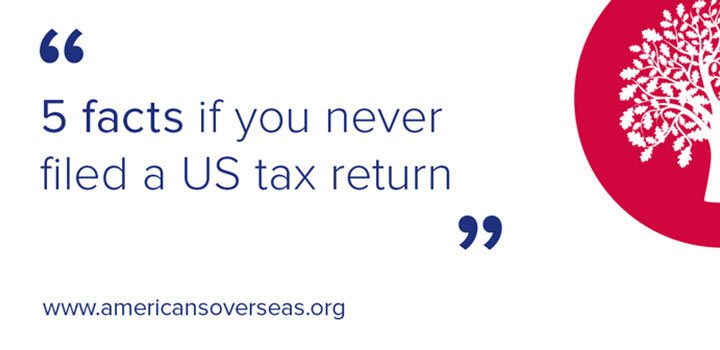
Tax Obligations for U.S. Citizens Overseas

Unawareness of your U.S. Citizenship Can Be Expensive.
U.S. Citizens Overseas are often unaware that they have an American tax obligation.
This lack of knowledge is costing many Americans overseas thousands of dollars because of the Foreign Account Tax Compliance Act, which forces banks to reveal the identity, accounts, and investment income of many of these Americans overseas.
All US citizens have a tax and Foreign Bank Account Reporting (FBAR) obligation, wherever they live or work in the world. This is governed by the American law FATCA and enforced by intergovernmental agreements between many countries and the US. The tax in the country of residence can be offset against the taxes owed in the US. This means that you almost always have to file taxes, but don’t necessarily owe any tax. However, failing to file US citizens’ overseas tax can result in high fines.
Here’s what you need to know about these requirements:
FATCA
Banks around the world have been voluntarily scrutinizing their customers to become compliant with the Foreign Account Tax Compliance Act (FATCA), a U.S. tax law passed in 2010.
Even though FATCA is a U.S. tax law, it has changed the way how banks in other countries conduct their business. Under FATCA, a foreign bank, investment house, or financial institution that is not compliant with the law is subject to a 30% withholding on their U.S.-source income.
A financial institution might have a portfolio of investments in the United States. Under FATCA, 30% of their U.S.-source interest, U.S.-source dividends, 30% of stock sales, 30% of bonds that mature, and 30% of U.S. real estate that gets sold will be withheld as a tax before ever reaching the financial institution and its account holders. A dramatically high fine for every bank and financial institute.
FBAR
Not only does the U.S. tax its citizens on their worldwide income, but under the Bank Secrecy Act, the U.S. also requires its citizens to declare the existence of any accounts held by financial institutions outside the U.S. A person must file a Report of Foreign Bank and Financial Accounts (FBAR) annually if they have an aggregate balance of at least $10,000 across all their non-U.S. accounts at any time during the year.
The foreign bank account report is information only. No tax or fee’s due when filing this report. But there are penalties for failing to file this report on time. Civil penalties can reach up to $10,000 per violation or 50% of the account balance at the time of the violation. Whichever amount is higher.
Form 1040
In addition to filing an FBAR with the US Treasury, every American living abroad must also file a tax return. America is the only civilized country that has a citizen-based taxation system. Declaring your worldwide taxes is complicated and important to do properly to avoid paying double taxation. Living abroad, Form 1116 or Form 2555 can be used to avoid double taxation along with various schedules and supplementary Forms.
Permanently renounce your American citizenship
Currently, the only way of completely avoiding paying US income tax is to permanently renounce one’s American citizenship.
If you’re a US citizen, green card holder, or have dual citizenship, and you have been living overseas, but you didn’t know you had to file a US tax return, it is time to inform yourself about the US tax system and your obligations.
In the year that a person renounces their U.S. citizenship, the person is subject to the regular income tax on their worldwide income plus an expatriation tax, or an “exit tax,” on the unrealized gains of real estate, investments, and other property. Terminating citizenship is a very personal choice. Americans Overseas can only present the pros and cons in this as objectively as possible so that everyone makes a very weighted choice for themselves as to what is right for them.
Americans Overseas helps with information about US citizens’ overseas tax
We, the founders of Americans Overseas, were born in the Netherlands and obtained our American nationality through our (American) mother. When we heard about this for the first time around 2013, we were in total disbelief (it can’t be true!), anger (how can they do this?), fear (am I going to get fined or pick up other problems?), and panic (what should I do?).
It is (unfortunately) true that there is an additional American tax levy. But there’s no information from the local government, and when approached, the consulate referred us to the IRS, and the IRS was impenetrable.
That’s why we started this initiative to help people from all over the world by providing proper information to avoid unnecessary panic and offering help free of obligation and free of charge. If needed, we have a network of affordable professionals (accountants) who can help you with your tax obligations.
If you have more questions about US citizens’ overseas tax you can contact us at Americans Overseas.
Contact us for more information
Frequently asked questions
Understanding the US tax system, the obligations, and all the additional terms can be difficult. Especially if one lives outside of America. Is your question not answered? Contact us.
-
Who is required to file taxes in the US?
U.S. citizens and resident aliens who live abroad are generally required to file a federal income tax return and pay taxes on their worldwide income.
Read more... about Who is required to file taxes in the US? -
Do US citizens living abroad still have to file taxes in the US?
Yes, US citizens are required to file taxes on their worldwide income, regardless of where they are living.
Read more... about Do US citizens living abroad still have to file taxes in the US? -
How can I cash my US check?
Received an American check? You can cash your check in the following ways: cash the check at your own bank, transfer to another person (endorsement), cash checks using an online service or cash the check by another bank.
Read more... about How can I cash my US check? -
Are there any special tax forms required for US citizens living abroad?
US citizens living abroad may be required to file Form 2555 and/or Form 1116 to claim the foreign-earned income exclusion.
Read more... about Are there any special tax forms required for US citizens living abroad? -
What is FBAR filing?
FBAR (Foreign Bank Account Report) filing is the requirement for certain U.S. individuals and entities to report their foreign financial accounts to the Financial Crimes Enforcement Network (FinCEN) of the U.S. Department of Treasury. The FBAR filing requirement applies to U.S. persons who have a financial interest in, or signature authority over, one or more foreign financial accounts if the aggregate value of those accounts exceeds $10,000 at any time during the calendar year.
Read more... about What is FBAR filing?





